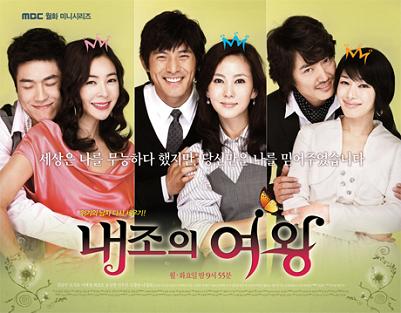So, after about a six month hiatus, I’ve finally resumed my Korean-rom-com-drama-watching habit. The show I selected to take up is not really as likable as most of my previous efforts – in fact, it’s a bit of a struggle not to end up just despising every single character in this show. But I’m sticking with, partly for that exact reason – I think it’s maybe innovative precisely in just how deeply flawed all the characters are.
And yet it manages to match most of the Korean rom-com conventions quite well, despite this. And maybe my perception of flaws is culturally related – which is to say, Koreans may not perceive the characters as all equally as deeply flawed as I do.
 The show in question is 내조의 여왕 [nae-jo-ui yeo-wang = Queen of Housewives]. The title already tells you just how atrociously tight to every conceivable bad Korean stereotype this show manages to stay. And as usual, I don’t want to post here an in-depth plot summary, as it’s not really interesting to me to try to do so, and I don’t want to spoil it for those interested in watching it.
The show in question is 내조의 여왕 [nae-jo-ui yeo-wang = Queen of Housewives]. The title already tells you just how atrociously tight to every conceivable bad Korean stereotype this show manages to stay. And as usual, I don’t want to post here an in-depth plot summary, as it’s not really interesting to me to try to do so, and I don’t want to spoil it for those interested in watching it.
It’s quite complicated. There’s a sort of “love hexagon” going on: three married couples, A-B, C-D, and E-F. But E and C love B, D loves A, A might love D too, but is loyal to B. F despises B because B was mean to her in high school, so nobody likes F, but she’s the nerd girl I thought I should feel the most sympathy for, but she’s the villain. E is A’s boss, and C is E’s boss, but C hates his wife D, it was an arranged marriage. Etc.
There’s lots of interesting moments of self-reinvention and intentionally symbolic behavior – i.e. the characters engaging in symbolism in a sort of self-aware way. There’s a resurrection scene like that, in episode 5 or 6, I think. B digs a grave and lies down in it with husband A, and they have a deep conversation. Then they both sit up, and resolve to do their best, moving forward, despite the obstacles.
I understand that A and B are supposed to be the protagonists, but B’s cruelty early in the story line is close to unforgivable, and she seems shallow and painfully self-centered. Her husband A has a heart of gold but is clearly dumb as a rock. He dances along from one out-of-control crisis to the next, never seeing anything coming.
Lastly, my favorite website for downloading these dramas (which shall remain nameless, here), has disappeared from the internet – which is partly why I dropped my drama-watching habit. The website posted free copies of the dramas with English subtitles, but I suppose the copyright police have taken them down. Fortunately, there is now a commercial website in the US that offers subtitled Korean drama, called mvibo.com. So I’ve broken down and started paying for the privilege of having subtitles. I hesitate to recommend it, though – the ironical act of sitting about 5 blocks from the MBC studios headquarters and watching streaming MBC content from some website in America means that the streaming quality is quite poor: the tubes under the Pacific are clogged with dead fish from the radiation in Japan, maybe. I wish I could figure out how to find the subtitled content from a Korean website – but I’ve given up hope on that.
So, you’re still wondering: what’s the ajummocracy? Ajumma [아줌마] is a Korean word used to refer to a particular type of middle aged or older woman, generally in an assertive, forceful sort of aspect. The ajumma represents the matriarchal “power behind the throne” that everyone says exists behind the monolithic facade of Korean patriarchy. Like all cultural stereotypes, it has some grains of truth, of course. I have coined the term “ajummocracy” for the concept of “government by ajummas.” The idea is that Korean women do, in fact, wield considerable political power, even in deeply traditionalist and Confucian (or pseudo-Confucian – this is important but I don’t want to get into it here) contexts. But they do so by manipulating their “men” behind the scenes. Again, I’m not endorsing this – I’m talking about cultural stereotypes. And it’s an interior cultural stereotype. That’s important – ajummas refer to themselves within this context, both deprecatingly and with pride. There is, in fact, an “ajumma pride” movement in Korea. Yes – really.
Back to the drama. This drama is perhaps the best encapsulation, in rom-com format, for that cultural stereotype. Every single female character is manipulative and ambitious. Every single male character is inconstant, mercurial, and temperamental. Each man submits, at some level, to his wife in private, while in public, they play macho games that seem to be either ghost-reflections of the ajumma politics or just male ranting and venting without consequences.
I do not suffer under the delusion that this portrait of Korean society is “real.” But it’s deeply interesting to me, the same way that reading Calderon de la Barca’s or Lope de Vega’s Spanish Golden Age dramas are deeply interesting, as each so transparently display all kinds of fascinating cultural detritus.
